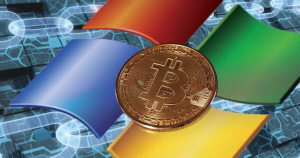Join Our Telegram channel to stay up to date on breaking news coverage
Among the leading tech giants and promising hot startups, few would think of Microsoft when talking about crypto. Yet, appearances are deceiving, and Microsoft has a reputation of trying to consistently get into the most profitable technologies, one way or the other.
Such is the case, not surprisingly, with blockchain. Despite not having make any public announcements on the matter, a software researcher from central Europe, going by the name Albacore, reported on Twitter that there is code in Microsoft’s Edge browser that can integrate a non-custodial crypto wallet.
Albacore expresses surprise that such a feature is considered for what is arguably one of the least popular browsers among tech-savvy people.
Newest in the gauntlet of questionable upcoming Microsoft Edge features, a crypto wallet 💸
Not really sure how to feel about this kind of thing being baked into the default browser, what are your thoughts?
More screenshots of the UI in the next tweet ➡️ pic.twitter.com/GAUPiZGLIY— Albacore ☁️ (@thebookisclosed) March 17, 2023
In the screenshots Albacore posted we can see a news feed, what looks like a decentralized application explorer and clearly a user interface for a crypto wallet that gives the ability to connect to Coinbase and Moonpay for purchasing cryptocurrency. Apparently, these features are already present in the recent versions of Microsoft Edge, but currently disabled and, as such, non-visible to the regular users.
While it is easy to get excited at the idea of the tech giant starting to adopt crypto, we need to keep a cool head and realize that many of the big tech companies, Microsoft included, often develop research experiments for new features that may, in the end, never be actually released. Albacore warns against that:
[The] Edge team are kings of throwing every imaginable thing at the wall and seeing if it sticks. The list of obsolete gimmick features that they tried and eventually removed is quite long.
In an interview with publication Decrypt, Albacore states that the wallet is actually fully functional already:
Considering I was able to use it just fine I’d imagine that a rollout is not out of question. [I] would hope that if it was a tiny trial they wouldn’t bother deploying the services to production.
Microsoft’s foray into profitable technologies
Despite being one of the biggest names in tech and, indeed, what most people associate (albeit incorrectly) with the first personal computer and operating system, Microsoft is known to be a follower, not a leader, in the tech field, and likes to buy into technologies pioneered by others, that have already proven profitable. Such was the case with Windows (idea taken from Apple), console gaming (XBox), browser (Internet Explorer, Edge), Skype, Teams and several others products.
Another cautionary note is that the products Microsoft gets into are often of much lower quality than the ones it competes to, either from the start (such as Internet Explorer) or subsequently become so (as it happened with Skype, for example).
Despite all this, we must pay attention to what Microsoft does because they are often financially successful due to Microsoft’s sheer size and adept sales & marketing strategies. It is therefore a good idea to become very hopeful for the prospects of crypto if Microsoft actually goes through with such features. Integration with Edge, which ships as the default browser to many of the world’s Windows personal computers, would undoubtedly push the adoption and accessibility of crypto massively into the population.
Copying rivals again?
Like we stated above, Microsoft often likes to copy features or products that are successful with their tech rivals. In the case of crypto wallets, we only need to look at rival browsers and notice quickly that is the case again. Opera’s main competitor, Brave Browser, is a privacy-centered browser that offers Web3 features, and Albacore believes it has served as inspiration for Microsoft.
Publication Decrypt reached out to Microsoft to get their take on the discovery and, while they did reply, they did so formally, without giving any specific details about their blockchain plans:
At Microsoft, we regularly test new features to explore new experiences for our customers. We look forward to learning and collecting feedback from customers but have nothing further to share at this time.
Jumping onto the AI Bandwagon?
Another example of a promising technology that Microsoft jumped in recently is Artificial Intelligence. With all the furor around ChatGPT these days, Microsoft did not waste any time and partnered with OpenAI, the organization behind the AI generating systems like ChatGPT, DALL-E 2 and GPT-3. In January of this year, it announced it has extended its partnerships in this area, with “multi-year, multi-billion-dollar” investments.
Microsoft announced in a blog post that it will continue to increase its investments in specialized supercomputing systems to accelerate OpenAI’s AI research and integrate its system with its products while “introducing new categories of digital experiences”. At the same time, Microsoft’s Azure cloud platform has become OpenAI’s exclusive cloud provider, and it’s powering the startup’s services, product and research.
Most significantly, Microsoft’s search engine, Bing, is now powered by OpenAI technology and, as several sources show, its results are now often now the best in the field.
In a video on AI, crypto investor Mark Moss compares investment advice given by ChatGPT and Microsoft Bing, and finds that Bing’s responses are almost always much better than the ones given by ChatGPT. One reason for this is, undoubtedly, that Bing’s AI is able to access the Internet, while ChatGPT is using data it has been fed in 2021:
The A.I. connection to the cryptocurrency field
AI is significant for crypto enthusiasts because it will affect many areas of life, and the cryptocurrency sector is no exception.
Thus, there are already A. I. Tokens that are currently rising in importance. These are cryptocurrencies that use AI in various ways to provide better privacy, user experience, security and other similar features. They are also sometimes digital tokens that are being used by AI-based apps or projects such as exchanges or decentralized marketplaces.
One example is Avalon, a Web3 gaming startup that is developing an open decentralized metaverse and is collaborating with AI companies to deploy features that lets users design their own world using generative AI technology.
Not its first foray into crypto?
The discovery of the wallet code is not the first time Microsoft is showing interest in cryptocurrency features. In August of 2021, it was discovered that the software giant filed and was granted a patent for implementing a cross-chain token management system:
JUST IN: Microsoft has received a US patent for a crypto-token software
– CoinDesk pic.twitter.com/Nk4TzMAjTC
— Blockworks (@Blockworks_) August 26, 2021
The patent’s description is a ledger-independent system designed to help users create tokens and managing them across different networks. It allows the development of software for transacting and managing tokens “in a manner that is agnostic of the underlying distributed ledger networks”. It’s a service that would present a single interface for managing token lifecycle across multiple blockchain.
Is Microsoft again copying from other projects in the open source community, such as the cross-chain settlement project ThorChain? It is not certain, at the moment, but if it does, it has certainly been inspired by a very promising project.
Given all this interest by the tech giant in crypto, while we cannot predict how things will pan out, the future is certainly beginning to sound very exiciting.
Related
Join Our Telegram channel to stay up to date on breaking news coverage


